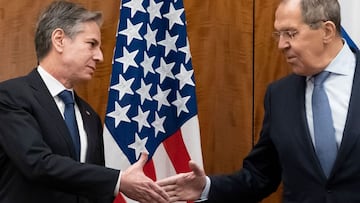Is Russia considering invading Ukraine? Why would Russia invade Ukraine?
President Putin has amassed around 100,000 troops on the Ukrainian border in recent weeks, sparking concern that a military offensive is imminent.


Secretary of State Antony Blinken has travelled to Europe this week in response to a burgeoning conflict on the Russia-Ukraine border. Blinken’s hastily arranged trip comes as Russian troops continue to gather at the border in what has been construed as an aggressive show of strength from President Vladimir Putin.
Blinken has had meetings with Ukrainian President Volodymyr Zelensky and Foreign Secretary Dmytro Kuleba and assured both that the United States would support Ukraine in the face of an invasion from neighbouring power Russia.
However officials involved in the talks are still unsure of exactly what Russia hopes to gain from the move, and how far Putin is willing to go to achieve his goals. Speaking about the situation from the Ukrainian capital of Kyiv, Blinken told reporters: “It’s not clear what Russia’s central demand is.”
Speaking to the New York Times, Russian foreign policy analyst Fyodor Lukyanov reiterated that sentiment, saying: “The expert opinion that I can authoritatively declare is: Who the heck knows?”
The first shipment of assistance recently directed by President Biden to Ukraine arrived in Ukraine tonight. This shipment includes close to
— U.S. Embassy Kyiv (@USEmbassyKyiv) January 22, 2022
200,000 pounds of lethal aid, including ammunition for the front line defenders of Ukraine. [1/2] pic.twitter.com/YeYanK0Px6
Why would Russia want to invade Ukraine?
The complicated history of Russian statehood and the politics of Eastern Europe will forever colour relations between Russia and Ukraine. The collapse of the Soviet Union saw numerous nations emerge from the ashes of the Eastern Bloc and Ukraine was the most populous area to split from Moscow.
As such the two nations share deep cultural ties and a 1,200-mile border. But despite the shared past Ukraine has slowly shifted more toward the West in recent years, becoming more integrated with the US and its allies. There is even some suggestion that Ukraine may one day join NATO, the alliance formed by Western powers in the aftermath of the Second World War to mediate the growing prominence of Soviet forces.
As Putin continues to amass troops at the Ukrainian border Russian officials have repeatedly denied that it is anything more than a military exercise. However the state has also released a list of demands to the West, which includes a pledge to not admit Ukraine to NATO and to remove NATO troops from Eastern Europe.
Ukraine vs Russia military by the numbers: pic.twitter.com/fsZF4Tkdib
— ian bremmer (@ianbremmer) January 21, 2022
With this in mind Russia’s movement on the Ukrainian border can be seen as an attempt to redress a shifting dynamic in Europe that could see Russia lose a historic ally. However it remains to be seen if Putin is willing to follow through with a physical attack on Ukrainian soil.
Will an invasion of Ukraine happen?
President Biden made headlines this week when answering a question at a news conference to mark the end of his first year in office. The President was asked if he though Putin would launch an offensive in Ukraine, to which he replied: “My guess is he will move in, he has to do something.”
This stark admission of the severity of the situation in the East did little to dispel fears but Biden insisted that Russia “will be held accountable” if any action is taken, warning that Putin has “never have seen sanctions like the ones I promised will be imposed.”
NEW: Biden says he believes Putin and Russia will "move in" on Ukraine pic.twitter.com/HPS9jYf7QX
— Bloomberg (@business) January 19, 2022
However Biden then appeared to admit that the US may opt against a major intervention with Russia in some instances: "It depends on what it does. It’s one thing if it’s a minor incursion and we end up having to fight about what to do and not do.”
Related stories
This uncertain tone is characteristic of the very fluid situation in Ukraine, where neither side is apparently sure of how far the other will go to protect its interests. What is clear is the degree of importance that a Russian invasion into Ukraine could have on global geo-politics.
According to Biden, an offensive over the Ukrainian border would be “the most consequential thing that has happened in the world since World War II.”

